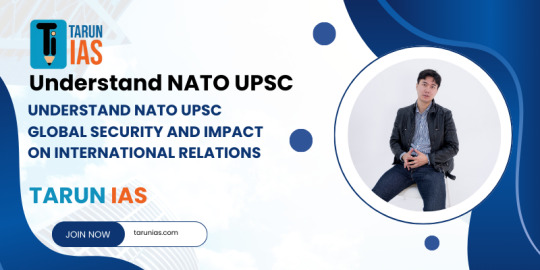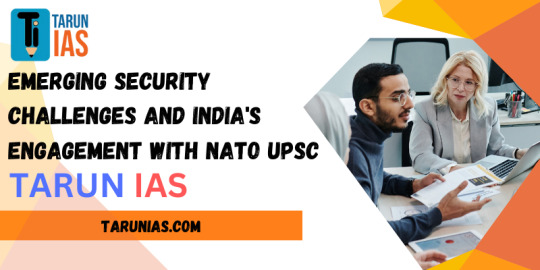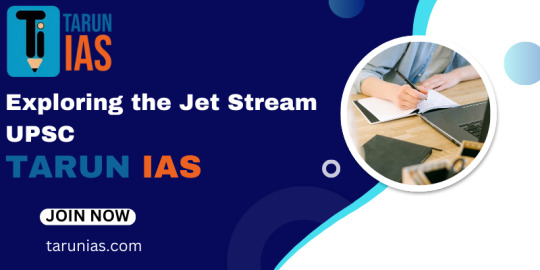Don't wanna be here? Send us removal request.
Text
NATO UPSC: Learn everything you need to know for UPSC Preparation

The North Atlantic Treaty Organization NATO UPSC is a cornerstone of European security and a significant player in global affairs. Its influence extends far beyond the European continent, making it a crucial topic for UPSC aspirants. This article provides a comprehensive overview of NATO, its history, objectives, structure, and relevance to UPSC preparation.
A Brief History of NATO
In 1949, NATO was established as a defensive alliance against the Soviet Union during the Cold War. The original members were Belgium, Canada, Denmark, France, Iceland, Italy, Luxembourg, Netherlands, Norway, Portugal, the United Kingdom, and the United States. Over the years, NATO has expanded to include many Eastern European countries and has evolved to address new security challenges.
NATO's Objectives and Principles
NATO's primary objective is to safeguard the freedom and security of its members through political and military means. Its core principles include:
Collective Defense: The most fundamental principle of NATO, it states that an attack on one member is considered an attack on all.
Consultation and Cooperation: NATO UPSC members are committed to consulting and cooperating on matters of common concern.
Peace and Security: NATO seeks to promote peace and security through dialogue, cooperation, and conflict prevention.
The Structure of NATO
NATO is a complex organization with a hierarchical structure. At the top is the North Atlantic Council (NAC), which is the supreme decision-making body. Below the NAC are various committees and working groups that deal with specific issues, such as military, political, and economic matters. NATO also has a military command structure, headed by the Supreme Allied Commander Europe (SACEUR).
NATO's Role in Global Affairs
NATO's role has expanded beyond its original focus on European security. It has become involved in a wide range of global issues, including:
Counterterrorism: NATO has played a significant role in counterterrorism operations, particularly in Afghanistan.
Cybersecurity: NATO has recognized the growing threat of cyberattacks and has taken steps to enhance its cyber capabilities.
Crisis Management: NATO has been involved in crisis management operations in various regions, including the Balkans and Africa.
NATO and the UPSC Syllabus
NATO is an important topic in the UPSC syllabus, particularly for the General Studies papers. Aspirants should be familiar with the following aspects of NATO:
History and Evolution: The evolution of NATO from a Cold War alliance to a global security organization.
Objectives and Principles: The core principles of NATO and its role in promoting peace and security.
Structure and Organization: The structure of NATO and the key decision-making bodies.
Global Role: NATO's involvement in global issues, such as counterterrorism, cybersecurity, and crisis management.
India's Relationship with NATO: India's evolving relationship with NATO and its implications for Indian foreign policy.
Conclusion
NATO UPSC is a complex and multifaceted organization that plays a crucial role in global affairs. Understanding NATO is essential for UPSC aspirants, as it is a topic that is frequently covered in the General Studies papers. By studying the history, objectives, structure, and global role of NATO, aspirants can develop a strong foundation in international relations and improve their chances of success in the UPSC exam.
0 notes
Text
Understand NATO UPSC global security and impact on international relations

The North Atlantic Treaty Organization NATO UPSC has emerged as a cornerstone of European and global security since its formation in 1949. As a military alliance, NATO's primary objective is to safeguard the freedom and security of its members through political and military means. This article will delve into the history, structure, and evolving role of NATO, examining its impact on international relations, particularly in the context of the post-Cold War era.
Historical Context and Founding Principles
NATO's origins can be traced back to the aftermath of World War II.
The threat of Soviet expansionism and the Cold War led to the formation of the alliance, based on the principle of collective defense enshrined in Article 5 of the North Atlantic Treaty. This principle stipulates that an attack against one member state is considered an attack against all.
NATO's Structure and Functions
NATO is a military alliance composed of 31 member states, primarily from Europe and North America. It is governed by the North Atlantic Council, which serves as the highest decision-making body. The alliance maintains a permanent military staff, coordinating military planning and operations.
Beyond its core function of collective defense, NATO UPSC has evolved to address a broader range of security challenges. These include counterterrorism, crisis management, and cooperative security partnerships with non-NATO countries. The alliance has played a significant role in peacekeeping and stabilization operations in various regions, such as the Balkans and Afghanistan.
NATO's Role in the Post-Cold War Era
The end of the Cold War presented NATO with a new set of challenges and opportunities. The alliance adapted to the changing geopolitical landscape by expanding its membership to include former Soviet bloc countries and engaging in new security initiatives.
One of the most significant developments in the post-Cold War era was NATO's involvement in the Kosovo War in 1999. The alliance conducted a military intervention to protect Albanian civilians from Serbian forces, marking a significant departure from its traditional focus on territorial defense.
NATO has also played a pivotal role in addressing emerging security threats, such as terrorism and cyber warfare. The alliance has established counterterrorism centers and has sought to enhance its capabilities in the realm of cyber defense.
NATO's Impact on International Relations
NATO's activities have had a profound impact on international relations. The alliance has served as a stabilizing force in Europe, promoting cooperation and preventing conflict. Its membership has provided security guarantees to its members, fostering economic growth and development.
However, NATO's expansion and policies have also been the subject of criticism. Some argue that the alliance's eastward expansion has contributed to tensions with Russia, leading to a resurgence of Cold War-era rivalries. Critics also contend that NATO's military interventions have been counterproductive, exacerbating conflicts and undermining regional stability.
Conclusion
NATO UPSC remains a vital institution in the global security architecture. Its role has evolved significantly since its founding, reflecting the changing nature of security threats. While the alliance has achieved considerable success in promoting peace and security, it faces ongoing challenges in adapting to a complex and interconnected world. As NATO continues to navigate these challenges, its impact on international relations will undoubtedly remain a subject of keen interest and debate
0 notes
Text
Dhoni Free Fire India Special Events: What You Need to Know

The popular mobile battle royale game, Free Fire, took India by storm. In 2020, Garena, the game's developer, made a strategic move by onboarding legendary Indian cricketer MS Dhoni as their brand ambassador for the Indian market. This partnership resulted in a series of exciting in-game events and exclusive rewards, collectively known as MS Dhoni Free Fire India Special Events. Here's a comprehensive breakdown of everything you need to know about these events:
0 notes
Text
JFSL Share Price Today: Live Updates for Delhi Investors
Jio Financial Services Ltd. (JFSL), the newest entrant in the Indian financial market, continues to be a hot topic for investors. As of today, July 9, 2024, Delhi-based investors can stay updated on the latest JFSL share price with this comprehensive guide.
Current JFSL Share
As of market close on July 8, 2024, the JFSL stock price stood at ₹348.35. This represents a slight decrease from the previous day's closing price of ₹352.50.
JFSL Share Price Performance
Since its listing on June 27, 2024, JFSL's share price has exhibited some volatility. Here's a quick breakdown of its performance:
Listing Day: The shares opened at a premium on both NSE and BSE, listing at ₹265 and ₹262 respectively, compared to the discovered price of ₹261.85. However, the day ended with a 5% lower circuit, closing at ₹251.75.
Post-Listing Volatility: The initial days saw fluctuations, with the price reaching a high of ₹354.80 on July 8th before experiencing a slight decline.
Factors Affecting JFSL Price
Several factors can influence the JFSL share price:
Market Sentiment: The overall health of the Indian stock market significantly impacts individual stock prices. Positive market sentiment can drive up JFSL's price, while negative sentiment can lead to a decline.
Company Performance: Investor confidence in JFSL's future prospects plays a crucial role. Upcoming financial reports, product launches, and strategic partnerships can all affect the share price.
Industry Trends: Performance of the financial services sector can also influence JFSL's price. Positive developments within the industry can boost investor confidence.
News and Announcements: Any company-related news or announcements, such as new ventures, acquisitions, or regulatory changes, can trigger price movements.
Where to Track JFSL stock Price Live
For Delhi-based investors, staying informed about the live JFSL price is crucial. Here are some reliable resources:
Financial News Websites: Major financial news websites like The Economic Times, The Financial Express, and Moneycontrol provide live stock quotes, including JFSL.
Stock Market Apps: Several stock market apps like NSE Mobile and BSE Star Mobile offer real-time share price updates, including charts and analysis tools.
JFSL Investor Relations: The official JFSL website might offer a dedicated investor relations section with share price information and updates.
Investing in JFSL Shares
As with any investment, careful consideration is necessary before buying JFSL shares. Here are some key points to remember:
Do Your Research: Thoroughly research JFSL's business model, financial statements, future plans, and the competitive landscape before investing.
Understand the Risks: All investments carry inherent risks. Be prepared for potential fluctuations in the JFSL price.
Invest Wisely: Allocate a portion of your investment portfolio to JFSL based on your risk tolerance and investment goals.
Seek Professional Advice: Consulting a financial advisor can be beneficial, especially for first-time investors.
Conclusion
JFSL's journey in the Indian stock market is still young. While its initial days have seen some volatility, the company holds immense potential in the dynamic financial services sector. By staying informed about the JFSL share price and the factors influencing it, Delhi-based investors can make informed decisions. Remember, investing requires patience and a well-defined strategy.
Take that first step toward your dream career. Contact Tarun IAS today and let us help you achieve UPSC success!
0 notes
Text
The North Atlantic Treaty Organization (NATO) is a crucial player in the global security landscape. Understanding its role and implications for India is essential for UPSC aspirants, particularly in the context of GS Paper II (International Relations). This article delves into NATO UPSC, exploring its history, significance, and potential implications for India.https://tarunias.com/
0 notes
Text
Emerging Security Challenges and India's Engagement with NATO UPSC

The evolving global landscape presents a multitude of security challenges that transcend national borders. In this context, the North Atlantic Treaty Organization (NATO), traditionally focused on Euro-Atlantic security, is redefining its role to address these emerging threats. India, a rising power with its own set of security concerns, has cautiously engaged with NATO in recent years. This article explores the emerging security challenges, examines India's strategic considerations regarding NATO UPSC (Union Public Service Commission), and analyzes the potential avenues for deeper engagement.
Emerging Security Challenges:
The world is witnessing a shift in the security paradigm. While traditional concerns like territorial disputes persist, new threats such as:
Cybersecurity: The increasing dependence on technology makes nations vulnerable to cyberattacks that can cripple critical infrastructure and disrupt essential services.
Maritime Security: The rise of piracy, illegal migration, and territorial disputes in key maritime regions like the Indo-Pacific necessitate robust naval cooperation.
Terrorism: The global threat of terrorism, with its evolving tactics and transnational networks, demands international collaboration for intelligence sharing and counter-terrorism operations.
Climate Change: The changing climate is triggering environmental disasters and resource scarcity, potentially leading to instability and conflict.
Proliferation of Weapons of Mass Destruction (WMDs): The continued existence of WMDs and the potential for their proliferation by rogue states pose a significant threat to global security.
These challenges require a collective response that transcends geographical boundaries. Here, established organizations like NATO, with its extensive member network and experience in collective security, can play a crucial role.
India's Strategic Considerations:
India, with its vast coastline, nuclear arsenal, and growing strategic weight, has a vital stake in maintaining global security. However, India's engagement with NATO UPSC needs to be viewed through the prism of its traditional foreign policy principles:
Strategic Autonomy: India cherishes its independent foreign policy, allowing it to make decisions based on its national interests without being bound by alliance obligations.
Non-Alignment: India has historically avoided formal military alliances, seeking partnerships based on shared interests rather than bloc politics.
Focus on Indo-Pacific: India's primary security concerns lie in its immediate neighborhood, including the rise of China and unresolved border disputes with Pakistan.
India-NATO Engagement: Potential Avenues:
Despite these considerations, India has recognized the value of cooperation with NATO on specific issues. This engagement can be further strengthened through the following means:
Dialogue and Information Sharing: Regular dialogue on emerging security threats like cyber and maritime security can foster mutual understanding and facilitate a coordinated response.
Joint Exercises: Participation in joint military exercises, even on a limited scale, can enhance interoperability between Indian and NATO forces and build trust.
Defense Cooperation: Collaborating on areas like defense technology development, training programs, and peacekeeping operations can benefit both parties.
Counter-terrorism Cooperation: Sharing intelligence and best practices in counter-terrorism can be crucial in tackling this global menace.
The Way Forward:
While full-fledged membership in NATO is unlikely for India in the foreseeable future, there is immense potential for a deeper and mutually beneficial partnership. India's engagement with NATO can evolve through a calibrated approach that prioritizes dialogue, information sharing, and cooperation on specific security challenges, all while preserving India's strategic autonomy.
Conclusion:
The world is at a crossroads, and navigating the complex security environment requires a collective effort. India, with its growing power and strategic significance, can play a vital role in shaping the global security architecture. By engaging constructively with NATO UPSC, India can contribute to international security while safeguarding its own national interests. This evolving partnership will be keenly observed in the context of the UPSC examinations, where an understanding of India's strategic calculus and its engagement with international organizations is crucial.
Take that first step toward your dream career. Contact Tarun IAS today and let us help you achieve UPSC success!
0 notes
Text
Exploring the Jet Stream UPSC: A Comprehensive Overview

The UPSC syllabus, particularly in GS Paper I (Geography) and GS Paper III (Environment & Disaster Management), emphasizes understanding atmospheric phenomena impacting weather patterns. Among these, the Jet Stream UPSC plays a crucial role in shaping global weather systems. This article delves into the complexities of the Jet Stream, a crucial concept for UPSC aspirants.
What is the Jet Stream?
The Jet Stream is a narrow band of fast-moving air currents located high in the troposphere (the lowest layer of the atmosphere). These winds travel at speeds exceeding 200 km/h (125 mph) and are concentrated in westerly directions (west to east). The temperature difference between the equator and the poles creates these high-speed winds. Warm air rises near the equator, creating a pressure difference that drives air currents towards the poles. As this air travels, it cools and descends, eventually returning towards the equator. This global circulation pattern, known as the Hadley Cell, creates the Jet Stream UPSC at the upper levels of the troposphere.
Types of Jet Streams:
There are two primary types of Jet Streams:
Polar Jet Stream: The most prominent jet stream, located at around 10-12 km above the Earth's surface, primarily in the Northern and Southern Hemispheres. This jet stream significantly influences mid-latitude weather patterns.
Subtropical Jet Stream: Located at higher altitudes (around 16-18 km) and weaker than the polar jet stream. It can have a significant impact on tropical weather systems.
Impact of Jet Stream on Weather Systems:
The Jet Stream plays a critical role in various weather phenomena:
Mid-Latitude Weather Systems: The meandering nature of the jet stream creates high and low-pressure zones that drive the formation of mid-latitude cyclones and anticyclones. These weather systems influence wind patterns, precipitation, and temperature variations across the globe.
Storm Tracks: The jet stream UPSC steers the movement of storm systems, impacting where they form, intensify, and weaken. Understanding the jet stream helps predict the movement of storms and potential weather events.
Temperature Variations: The jet stream can act as a barrier, separating warm and cold air masses. A stronger jet stream can lead to more extreme temperature variations between polar and tropical regions.
Jet Stream and Climate Change:
Climate change is altering global atmospheric circulation patterns, potentially impacting the behavior of the jet stream. Some studies suggest that a warming climate could lead to a wavier jet stream, resulting in more extreme weather events like heatwaves, droughts, and floods in certain regions.
Importance of Jet Stream for UPSC:
Understanding the Jet Stream for UPSC aspirants is crucial due to its influence on various aspects covered in the syllabus:
Climate Change: The impact of climate change on the jet stream and its link to extreme weather events is a critical area of UPSC focus.
Weather Patterns: Knowledge of the jet stream helps understand the formation and movement of weather systems, impacting regional climate and agriculture.
Disaster Management: Predicting the trajectory of storms and other weather events relies heavily on understanding the behavior of the jet stream.
Conclusion:
The Jet Stream UPSC is a powerful force shaping weather patterns across the globe. Understanding its behavior and how it interacts with climate change is essential for UPSC aspirants aiming to excel in Geography, Environment, and Disaster Management. As research on the jet stream's response to climate change continues, staying updated on this crucial aspect of weather systems will be increasingly important.
Take that first step toward your dream career. Contact Tarun IAS today and let us help you achieve UPSC success!
0 notes
Text
What is the Significance of El Nino Modoki UPSC?

El Nino Modoki, a variant of the traditional El Nino phenomenon, has garnered increasing attention for its unique characteristics and significant impacts on global weather patterns. Understanding the significance of El Nino Modoki, particularly from the perspective of the UPSC, is essential for comprehending its implications on various sectors. it explores the forecasting of El Nino Modoki UPSC events and discusses potential mitigation strategies and policy implications in addressing its effects.
Definition and Characteristics
El Nino Modoki is like the quirky cousin of the traditional El Nino – similar, yet with its own unique twist. While classic El Nino events are characterized by warmer sea surface temperatures in the central and eastern tropical Pacific, El Nino Modoki features a different temperature pattern. In this phenomenon, the warmest waters are found in the central Pacific, flanked by cooler waters to the east and west. It's like a tropical ocean temperature sandwich!
Historical Background
El Nino Modoki first caught the scientific spotlight in the early 2000s, but its presence has been felt throughout history. Researchers have delved into historical climate data and discovered evidence of Modoki events dating back to the 1950s. It's like finding a hidden gem in the treasure trove of climate records, adding a new dimension to our understanding of ocean-atmosphere interactions.
Understanding the UPSC Perspective
When it comes to the UPSC (Union Public Service Commission) perspective, knowing about El Nino Modoki is like having an extra arrow in your quiver of climate knowledge. UPSC exams often delve into current affairs and environmental issues, and understanding the significance of this phenomenon can give you an edge in tackling questions related to climate change, weather patterns, and their impacts on society.
Impact of El Nino Modoki on Global Weather Patterns
Oceanic and Atmospheric Conditions
El Nino Modoki UPSC can stir up a meteorological cocktail that affects weather patterns worldwide. The unique arrangement of warm and cool waters in the tropical Pacific can influence atmospheric circulation, leading to disruptions in rainfall patterns, droughts, and even tropical cyclone activity in different parts of the globe. It's like playing a game of climate dominoes – one change in the Pacific can set off a chain reaction of weather impacts elsewhere.
Regional Climate Effects
From the scorching heatwaves in Australia to altered monsoon patterns in South Asia, El Nino Modoki's reach extends far and wide. Different regions experience varying impacts, with some areas facing water scarcity and agricultural challenges, while others may be battered by extreme storms and flooding. It's like Mother Nature's way of reminding us that her weather palette is as diverse as it is unpredictable.
Comparison with Traditional El Nino Phenomenon
Spatial and Temporal Differences
While classic El Nino events tend to grab more headlines, El Nino Modoki quietly plays its own role on the climatic stage. The spatial distribution of warm waters in Modoki differs from the traditional pattern, leading to distinct impacts on weather systems across different regions. It's like comparing a classic Hollywood blockbuster to an indie film – both have their charm, but one may surprise you with its unique storyline.
Impacts on Weather Systems
When it comes to influencing weather systems, both El Nino and El Nino Modoki are no wallflowers. While classic El Nino events can bring heavy rainfall to some regions and drought to others, Modoki events can shuffle the deck and create a whole new set of weather cards to deal with. Understanding these differences is like being a weather detective, piecing together clues to unravel the mysteries of our ever-changing climate.
Agricultural Productivity
When El Nino Modoki hits the scene, it can throw a major curveball at agricultural productivity. This weather phenomenon can mess with rainfall patterns and temperatures, affecting crop growth and possibly leading to lower yields of essential food supplies.
Economic Consequences
The ripple effects of El Nino Modoki UPSC don’t just stop at the farm gate - they can hit the economy at large. Reduced agricultural output can lead to food shortages, price hikes, and even food insecurity in some regions. This can then trickle down into other sectors like manufacturing and transportation, impacting overall economic growth. Governments and businesses must be prepared to weather the storm.
Take that first step toward your dream career. Contact Tarun IAS today and let us help you achieve UPSC success!
0 notes
Text
What is the Significance of Understanding Money Laundering UPSC?

For aspirants aiming to crack the prestigious UPSC Civil Services Examination (CSE), comprehending the intricacies of money laundering UPSC is not just another topic – it's a crucial element in ensuring national security and economic well-being. Here's a deep dive into why understanding money laundering holds immense significance for UPSC aspirants:
Money Laundering: A Threat to National Security:
Money laundering isn't just a financial crime; it fuels activities that directly threaten a nation's security. Here's how:
Terrorist Financing: Illegally obtained funds from drug trafficking, human smuggling, and other criminal activities are often laundered to finance terrorism. Understanding money laundering allows future civil servants to identify and disrupt these financial flows, potentially preventing terror attacks.
Organized Crime: Money laundering strengthens organized crime groups by allowing them to clean their illicit profits and reinvest them in further criminal activities. UPSC aspirants who grasp the financial trails of money laundering can help dismantle these criminal networks.
State Destabilization: Large-scale money laundering weakens a nation's financial system and erodes public trust in institutions. UPSC aspirants with a grasp of money laundering can implement robust anti-money laundering (AML) frameworks to safeguard national security.
Money Laundering: A Drain on the Economy:
The consequences of money laundering UPSC extend far beyond national security. Here's how it impacts the economy:
Economic Distortion: Laundered money distorts legitimate economic activity by creating an unfair advantage for criminal enterprises. Understanding money laundering empowers future civil servants to create a level playing field for honest businesses.
Loss of Revenue: Tax evasion is a common element of money laundering. UPSC aspirants who understand money laundering can craft effective strategies to recover lost tax revenue and boost government finances.
Undermines Financial Integrity: Money laundering erodes the integrity of the financial system by introducing illicit funds into legal channels. Understanding this allows future civil servants to implement robust regulations and oversight mechanisms to maintain financial stability.
The Role of a Civil Servant in Combating Money Laundering:
UPSC aspirants aiming to become civil servants will play a vital role in combating money laundering. Here are some potential areas of involvement:
Policy Formulation: Civil servants may be involved in drafting and implementing effective AML legislation and regulations.
Law Enforcement: Understanding money laundering empowers civil servants to collaborate with law enforcement agencies to track illicit financial flows and prosecute money launderers.
Public Awareness: Civil servants can play a crucial role in raising public awareness about the dangers of money laundering and encouraging people to report suspicious activity.
How to Prepare for Money Laundering in UPSC:
Syllabus Coverage: Money laundering finds mention in the UPSC syllabus under various sections like Public Administration, Indian Economy, and Internal Security. Look for keywords like "black money," "financial crimes," and "organized crime."
Current Affairs: Money laundering cases and government initiatives to combat them are frequently reported in newspapers. Stay updated on current developments related to AML efforts.
Analytical Approach: Don't just memorize facts. Analyze case studies and reports to understand the methods used by money launderers and how they can be countered.
Conclusion:
For UPSC aspirants, understanding money laundering UPSC is not just about scoring marks; it's about acquiring knowledge critical for safeguarding national security and economic prosperity. By effectively combating money laundering, future civil servants can build a stronger and more secure India. So, delve deep into this crucial topic, and contribute to a brighter future for the nation.
Take that first step toward your dream career. Contact Tarun IAS today and let us help you achieve UPSC success!
0 notes
Text
Cracking the UPSC with the Best IAS Coaching in Delhi

The dream of securing a coveted position in the Indian Administrative Services (IAS) ignites a fire in the hearts of many aspiring civil servants. Delhi, the heart of India, is a hub for IAS preparation, brimming with coaching institutes vying for your attention. But with so many options, finding the best IAS coaching in Delhi can be overwhelming.
Why Choose Coaching for UPSC Preparation?
While self-study is commendable, opting for the best IAS coaching Institute in Delhi offers distinct advantages:
Structured Learning: Coaching institutes provide a well-defined syllabus coverage, ensuring you don't miss any crucial topics.
Expert Guidance: Experienced faculty members, many with UPSC experience themselves, offer invaluable guidance and clear explanations of complex concepts.
Comprehensive Study Material: Coaching institutes provide comprehensive study materials, including notes, test series, and current affairs updates, saving you time and effort.
Peer Learning and Competition: A stimulating learning environment fosters peer interaction, keeps you motivated, and helps you gauge your preparation level.
Answer Writing Practice: Coaching institutes provide regular answer writing practice sessions, crucial for developing the writing skills demanded by the UPSC exam.
Choosing the Best IAS Coaching in: Key Considerations
With a plethora of coaching institutes available, how do you identify the best IAS coaching in Delhi for you? Here are some key factors to consider:
Track Record and Reputation: Research the institute's success rate in terms of past students who have cleared the UPSC exam. Look for reviews and testimonials from former students.
Faculty Expertise: Analyze the faculty's qualifications and experience. Do they have a proven track record of guiding students to success?
Course Structure and Methodology: Ensure the coaching institute's approach aligns with your learning style. Does it offer a flexible schedule and cater to individual needs?
Study Material Quality: Evaluate the quality and comprehensiveness of the study materials provided. Are they updated regularly and aligned with the latest UPSC syllabus?
Infrastructure and Facilities: Consider the physical infrastructure of the coaching institute. Does it offer a conducive learning environment with necessary facilities like libraries and discussion rooms?
Fees and Affordability: IAS coaching can be an investment. Compare fees of different institutes and understand the value they offer for the cost.
Beyond the Checklist: Finding the Right Fit
While these factors are crucial, finding the best IAS coaching in India is also about personal fit. Here are some additional tips:
Attend Demo Classes: Sample classes at shortlisted coaching institutes. Feel the teaching style, gauge the faculty's approach, and assess if it resonates with you.
Location and Accessibility: Choose an institute conveniently located, considering your commute time and its impact on your study schedule.
Batch Size and Individual Attention: Consider the batch size. Smaller batches often allow for more personalized attention, which can be beneficial.
Remember:
The best IAS coaching in India is not a magic bullet. Your dedication, hard work, and perseverance are the primary drivers of success. Coaching institutes can equip you with the knowledge and skills, but ultimately, cracking the UPSC requires your unwavering commitment.
At Tarun IAS, we're committed to helping you turn your IAS aspirations into reality. Contact us today for a free counseling session and take that crucial first step toward achieving your UPSC dream.
#best upsc coaching in delhi#best ias coaching in delhi#best upsc coaching in india#best ias coaching in india
0 notes
Text
Cracking the UPSC? Best IAS Coaching in Delhi for You

The Union Public Service Commission (UPSC) Civil Services Examination (CSE) is undoubtedly one of the most prestigious and challenging exams in India. Cracking the UPSC opens the door to a distinguished career serving the nation as an Indian Administrative Service (IAS) officer, Indian Police Service (IPS) officer, or in other coveted civil service roles. Delhi, the heart of India, is a hub for IAS aspirants seeking the best coaching to guide them towards success. With a plethora of institutes offering IAS coaching in Delhi, choosing the right one can feel overwhelming. This article will equip you to navigate this crucial decision and find the Best IAS Coaching in Delhi for You.
0 notes
Text

The Indian Administrative Service (IAS) examination is considered one of the most prestigious and challenging exams in India. Cracking the UPSC Civil Services Exam, the gateway to the IAS, demands unwavering dedication, strategic preparation, and the right guidance. If you aspire to become an IAS officer and contribute to nation-building, enrolling in the best IAS coaching in Delhi can significantly enhance your chances of success.
0 notes
Text
Crack UPSC with The Best UPSC coaching in Delhi in English medium

The UPSC Civil Services Exam, commonly known as UPSC, is undoubtedly one of India's most prestigious and challenging competitive examinations. For aspirants aiming to become IAS, IPS, or IFS officers, cracking this exam opens doors to a coveted career in civil service. Given the vast syllabus and intense competition, enrolling in the Best UPSC Coaching in Delhi can significantly increase your chances of success, especially if you're targeting the English medium.
0 notes
Text
Crack NATO UPSC: Essential Guide & Strategy for Success

The North Atlantic Treaty Organization (NATO) UPSC exam is a highly sought-after gateway to a prestigious career in international relations and national security. Cracking NATO UPSC requires meticulous planning, strategic preparation, and unwavering dedication. This comprehensive guide equips aspiring candidates with the essential knowledge and strategies of NATO to conquer UPSC.
Understanding NATO for UPSC
NATO, also known as the North Atlantic Treaty Organization Union Public Service Commission Exam, is a national-level recruitment exam conducted by the UPSC (Union Public Service Commission) to select officers for various positions within the Indian Ministry of External Affairs dealing with NATO affairs. Success in NATO guarantees a dynamic and fulfilling career shaping India's strategic partnerships and engagement with NATO.
Eligibility Criteria for NATO
Before embarking on your preparation journey, ensure you meet the eligibility criteria for NATO:
Citizenship: You must be a citizen of India.
Age Limit: The minimum and maximum age limits are subject to change, so refer to the latest UPSC notification for the current year.
Educational Qualification: A bachelor's degree from a recognized university is mandatory.
Exam Pattern and Syllabus
The NATO UPSC exam follows a two-stage selection process:
Preliminary Examination: This objective-type exam comprises two papers – General Studies Paper I and General Studies Paper II (CSAT). Both papers are qualifying in nature, and marks obtained are not considered for the final merit list.
Main Examination: This stage consists of a written examination and an interview. The written exam includes seven papers, specifically designed to assess a candidate's knowledge, analytical skills, and suitability for the role.
For a detailed understanding of the syllabus and topics covered in each paper, refer to the official UPSC notification for NATO.
Recommended Resources for NATO UPSC Preparation
UPSC Syllabus and Previous Years' Question Papers: Refer to the official UPSC website for the latest syllabus and previous years' question papers to gain insights into the exam format and question trends.
NCERT Textbooks: NCERT textbooks for various subjects provide a strong foundation for General Studies preparation.
Standard Reference Books: Supplement your preparation with standard reference books recommended for the UPSC Civil Services Examination (CSE) and international relations.
Current Affairs Magazines and Periodicals: Subscribe to credible current affairs magazines and periodicals to stay updated on national and international developments.
Online Resources and Coaching Classes: Explore online resources and coaching classes specifically designed for NATO preparation for UPSC. These can offer valuable guidance, study materials, and mentorship.
Beyond Textbooks: Essential NATO Skills for UPSC
While a strong knowledge base is crucial, success in NATO for UPSC hinges on developing essential skills:
Critical Thinking and Analysis: The ability to analyze complex information, identify key issues, and form well-reasoned arguments is paramount.
Problem-Solving Skills: Develop effective problem-solving skills to address challenges related to international security and diplomacy.
Communication Skills: Hone your written and verbal communication skills to articulate your thoughts clearly and persuasively.
Leadership and Decision-Making: Develop strong leadership qualities and the ability to make sound decisions under pressure.
Time Management: Effective time management is essential for covering the vast syllabus, practicing answer writing, and revising effectively.
Remember: Patience, perseverance, and a focused approach are key to cracking NATO UPSC. With dedication, a strategic plan, and the right resources, you can turn your dream of a career with NATO into a reality.
Ready to embark on your UPSC journey? Contact Tarun IAS today and take the first step towards achieving your civil service aspirations!
0 notes
Text
Cracking the UPSC: Your Guide to Finding the Best IAS Coaching in Delhi

The dream of becoming an IAS officer and serving the nation ignites a fire in many young minds. But the UPSC Civil Services Exam (CSE) is notoriously challenging, demanding focused preparation and strategic guidance. This is where the Best IAS coaching in Delhi comes in.
0 notes